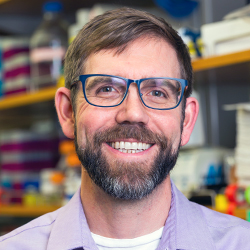International Synthetic Biology Team to Create an Ancient Cell
Project funded by a highly competitive Human Frontier Science Program award
An international team including Northwestern Engineering’s Michael Jewett wants to unravel millennia of evolution to create an ancient version of a cell.
 With funding from the highly competitive Human Frontier Science Program, the interdisciplinary team hopes to make this plan a reality. Using synthetic biology, they will create a cell that uses RNA enzymes, called ribozymes, to recapitulate a key step in evolution; the invention of translation and the establishment of the genetic code.
With funding from the highly competitive Human Frontier Science Program, the interdisciplinary team hopes to make this plan a reality. Using synthetic biology, they will create a cell that uses RNA enzymes, called ribozymes, to recapitulate a key step in evolution; the invention of translation and the establishment of the genetic code.
“It has long been hypothesized that modern cells evolved from an ‘RNA world’,” said Jewett, associate professor of chemical and biological engineering and co-director of Northwestern’s Center for Synthetic Biology. “We wonder if this hypothesis is true, and seek to ask the question if it is possible to move back our current, protein-based biological world to look more like an ancient RNA-based one.”
The Human Frontier Science Program challenges life scientists to identify important problems in their disciplines and then tackle them in new ways. Selected projects receive three years of support. Team members must represent at least two different countries.
Jewett’s team includes Andrew Ellington, professor of chemistry and biochemistry, at the University of Texas at Austin; Philippe Marliere, synthetic biologist at Genopole Evry in France; and Hiroaki Suga, professor of chemistry, at the University of Tokyo.
“Our project brings together the best of chemistry, biochemistry, biochemical engineering, and molecular evolution to address a problem that has been untouchable in the past,” said Ellington, the project’s principal investigator.
Information encoded in DNA and RNA enables the synthesis of proteins to perform a wide array of functions in living cells, including metabolic function and DNA replication. This interdisciplinary team plans to build a replicating organism that may lead to the development of a more ribozyme-centric information flow. Not only could this illuminate why cells needed to evolve to make proteins, the project could also help scientists understand how to use evolutionary optimization to build multi-scale systems.
“We wonder if it is possible to revert the process of translation to using fewer proteins,” Jewett said. “This will push the limits of our understanding.”